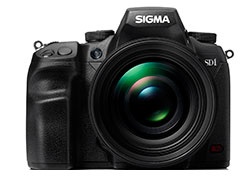By Kevin Ames
The latest DSLR camera from Sigma Corporation is the SD1 Merrill, named for Richard “Dick” Merrill, inventor of the X3F CMOS chip, which uses a type of layering that splits light into red, green, and blue at every one of the 4,800×3,200 photo sites on the sensor.
A RAW file yields a 45-megapixel capture. Sigma Photo Pro software processes the Foveon Merrill files into 8- or 16-bit TIFFs or 8-bit JPEGs in half, standard, or double file sizes. A 16-bit TIFF opens as a 337.7-MB file, or 35×52″ at 180 ppi. This APS-C cropped-format camera is the equivalent of a 30-megapixel, medium-format digital back.
The dual TRUE II (Three-layer Responsive Ultimate Engine) chips render colors with smooth gradations at high resolutions. The SD1 Merrill is practically moiré-proof, making it a great choice for shooting fashion where detail counts and high-frequency patterns abound.
The ISO range is 100–6,400 on the SD1 Merrill. As with most cameras, lower ISOs produce significantly less noise and the SD1 Merrill delivers acceptable results at ISO 800. Shutter speeds range from 1/8000 to 30 seconds, plus a Bulb setting. Exposure modes include three programmable custom modes along with the standards: program automatic exposure, aperture priority, shutter priority, and (my personal favorite) manual exposure. The camera connects to the computer with a supplied USB 2 cable. It has video out for NTSC/PAL monitors, a flash sync PC socket, power in, and a remote-release plug as well.
The SD1 Merrill is splashproof with improved seals in its magnesium alloy body that guard it against harsh weather conditions and dust incursions.
You can set autofocus (AF) points automatically or with the four-way controller. AF is activated by depressing the shutter release half way or separated to a “back-focus” button by using a custom function. Unique to the SD1 Merrill is the Quick
Set menus button that accesses eight critical photographic functions. Press once to set ISO, metering mode, AF mode, and built-in flash settings. A second push opens white balance, image size, color mode, and image quality. Each is adjusted by pressing its corresponding button on the four-way controller. Quick Set menus, image information, and playbacks display on the bright 3″ TFT LCD monitor.
A single supplied rechargeable battery powers the SD1 Merrill for several days of shooting to a CF card. Tethered shooting requires a battery change every three hours or so. Sigma Capture Pro software (free!) for Mac or Windows controls the camera remotely via USB. The photos open in Sigma Photo Pro for review and processing. Shooting RAW + JPEG allows Bridge to open the JPEGs. (Note: At this writing, the SD1 Merrill X3F format isn’t supported in Adobe Camera Raw.)
Using the SD1 Merrill reminded me of shooting film with a motorized Hasselblad because, while the SD1 Merrill shoots up to 5 frames per second, the buffer fills completely after seven shots. Depending on the speed of the CF card, it can take a minute to clear completely. When buffered out, the SD1 Merrill is usually ready for a single shot in about 10 seconds. The price for the ultrahigh detail is waiting for massive files to transfer to the card—much as I had to change film in the ’Blad every 12 frames.
I recommend the SD1 Merrill as a medium-format alternative for serious photographers who want both high resolution from a cropped-sensor camera and an extensive choice of lenses at a reasonable price. It’s great for doing high-quality work where capturing fine detail and color fidelity counts. And it’s wonderful outdoors with landscapes or in the studio for products, portraits, fashion, and fine-art photography.
The SD1 Merrill is not a camera for high-volume photography like sports, where a sustained high-speed frame rate is required.
Note: As a matter of full disclosure, I’m one of four Sigma Pros. I also shoot Canon 1Ds Mark III and 5D Mark II cameras.
Company: Sigma Corporation of America
Price: US$2,299
Web: www.sigmaphoto.com
Rating: 4.5
Hot: Medium-format color and resolution at a DSLR price
Not: Doesn’t offer live view or video capture capabilities
(This review is brought to you courtesy of “Layers Magazine”: http://layersmagazine.com/ .)


